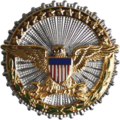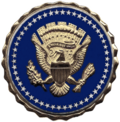Brad Cooper (admiral)
Brad Cooper | |
|---|---|
 | |
| Birth name | Charles Bradford Cooper II |
| Born | 1967 (age 57–58) Winston-Salem, North Carolina, U.S. |
| Allegiance | United States |
| Service | United States Navy |
| Years of service | 1989–present |
| Rank | Vice Admiral |
| Commands | United States Naval Forces Central Command United States Fifth Fleet Naval Surface Force Atlantic Expeditionary Strike Group 7 United States Naval Forces Korea USS Gettysburg (CG-64) USS Russell (DDG-59) |
| Battles / wars | Gulf War Operation Deny Flight War in Afghanistan Red Sea crisis |
| Awards | Navy Distinguished Service Medal Defense Superior Service Medal (2) Legion of Merit (4) Bronze Star Medal |
| Alma mater | United States Naval Academy (BS) National Intelligence University (MS) United States Army Command and General Staff College Harvard University Tufts University |
| Spouse(s) | Susan Cooper[1] |
Charles Bradford "Brad" Cooper II[2] (born 1967),[3] is a United States Navy vice admiral who has served as the deputy commander of United States Central Command since February 2024. He most recently served as commander of United States Naval Forces Central Command, Commander, United States Fifth Fleet and Commander, Combined Maritime Forces from 2021 to 2024.[4][5] He previously served as Commander, Naval Surface Force Atlantic and, before that, as the Chief of Legislative Affairs of the United States Navy.[6][7] In June 2025, secretary of defense Pete Hegseth announced that Cooper was president Donald Trump's nominee for commander of the United States Central Command. Cooper will be the first Navy admiral to hold the post since William J. Fallon in 2008.
Early life and education
[edit]Cooper was born in 1967[3] and is the son of a U.S. Army officer.[4] He attended Sidney Lanier High School in Montgomery, Alabama, and is a 1989 graduate of the United States Naval Academy,[2] where he obtained a bachelor of science degree in economics.[1] Cooper later earned a master's degree in strategic intelligence from the National Intelligence University,[6] and also studied national security policy and international relations at Harvard and Tufts Universities.[4] He is also a graduate of the United States Army Command and General Staff College.[1]
Naval career
[edit]A career surface warfare officer, he served on guided-missile cruisers, guided-missile destroyers, aircraft carriers and amphibious assault ships.[4] Cooper's assignments included the USS Thomas S. Gates (CG 51), operations officer of the USS Fitzgerald (DDG 62) and USS Anzio (CG 68), and executive officer of the USS Vicksburg (CG 69).[1] He was also the flag aide to the commander of the USS Dwight D. Eisenhower Carrier Strike Group.[1] His ship commands were the USS Russell (DDG 59) and USS Gettysburg (CG 64).[4]
Among his deployments were Operation Desert Storm; three counter-narcotics operations off the coast of South America; the enforcement of the no-fly zone over Bosnia and Herzegovina and operations in the build up to the Kosovo War; Haitian migrant operations; a deployment in the Western Pacific, and multiple deployments in the Middle East, including on the ground during the war in Afghanistan.[1]
Ashore, he served in a variety of executive, military assistant and special assistant roles in the White House, the Office of the Secretary of Defense, U.S. Africa Command and U.S. Pacific Fleet headquarters.[4] These included special assistant to the Commander, U.S. Africa Command; division chief for strategic reform of the Afghan Police and Border Guards while assigned to Combined Security Transition Command, Afghanistan; and flag aide to the Commander, U.S. Pacific Fleet.[1] He also served as principal U.S. Advisor to the Interior Minister of Afghanistan[4] and both Deputy Director[1] and Director, Surface Warfare Officer assignments (Pers-41),[4] at Navy Personnel Command.[1]
As a flag officer, he served as the Chief of Legislative Affairs, where he led the Navy's engagement with the U.S. Congress. Other tours include commander, Naval Surface Force Atlantic, where he launched new initiatives to expand mental health care access for sailors and improve fleet-wide readiness; commander, Expeditionary Strike Group 7 in Okinawa, Japan, where he led the U.S. military's first F-35 deployment; and, commander, U.S. Naval Forces Korea. During this tour, his sailors were honored with the Republic of Korea Presidential Unit Citation, the first such recognition of a Navy unit since the Korean War.[4] During his tenure as commander of Naval Forces Korea, Cooper was bestowed the Korean name Goo Tae-il[a] by the ROK-US Alliance Friendship Association in honor of his service to the Korean peninsula.[8]
In April 2021 he was nominated for promotion to vice admiral and the position in Bahrain of Commander, U.S. Naval Forces Central Command; commander, U.S. Fifth Fleet; and commander, Combined Maritime Forces.[9] Cooper assumed command on 5 May 2021.[5] During this tour, he significantly expanded multi-national maritime partnerships, established the Navy's first unmanned and artificial intelligence Task Force, and led multiple real world operations countering Iranian and Houthi malign activity throughout the Middle East, including operations Prosperity Guardian and Poseidon Archer in the southern Red Sea.[6] He was in charge of U.S. naval forces in Middle Eastern waters when Operation Prosperity Guardian began in December 2023 to defend merchant ships from attacks by the Houthis in Yemen.[10]
In April 2023, Cooper was nominated for reappointment as vice admiral and assignment as the deputy commander of United States Central Command.[11][9] He took office in February 2024.[12] That same month, he told the media that the actions against the Houthis represent the largest and most intense operation of the U.S. Navy since World War II.[13] In June 2025, secretary of defense Pete Hegseth announced that Cooper was president Donald Trump's nominee for commander of the United States Central Command.[14]
Personal life
[edit]He is married to Susan, who is a speech-language pathologist, and they have two children.[1]
Cooper was briefly a fellow of the Asia Pacific Center for Security Studies.[1]
Awards and decorations
[edit]
| ||

| ||

| ||

| ||
Notes
[edit]- ^ In this Korean name, the family name is Goo.
References
[edit]![]() This article incorporates public domain material from websites or documents of the United States government.
This article incorporates public domain material from websites or documents of the United States government.
- ^ a b c d e f g h i j k "White House Author – Brad Cooper". Obama White House. 18 November 2011. Retrieved 3 May 2025.
- ^ a b Burylo, Rebecca (23 January 2017). "Lanier grad promoted to rear admiral". Montgomery Advertiser. Retrieved 3 May 2021.
- ^ a b Register of Commissioned and Warrant Officers of the United States Navy on Active Duty. Bureau of Naval Personnel. 1 October 1990. p. 180. Retrieved 5 June 2021.
- ^ a b c d e f g h i "Vice Admiral Brad Cooper". Archived from the original on 11 January 2024. Retrieved 3 May 2025.
 This article incorporates text from this source, which is in the public domain.
This article incorporates text from this source, which is in the public domain.
- ^ a b "NAVCENT, U.S. Fifth Fleet, CMF Change of Command". U.S. Naval Forces Central Command. 6 May 2021.
- ^ "Flag Officer Announcements". U.S. DEPARTMENT OF DEFENSE.
- ^ Lee Chi-dong (19 July 2017). "U.S. naval commander to get Korean name". Yonhap News Agency. Retrieved 30 June 2021.
- ^ a b "Flag Officer Announcements". U.S. Department of Defense. 24 April 2023. Retrieved 25 April 2023.
- ^ "NAVCENT Commander Vice Admiral Brad Cooper Holds an Off-Camera, On-The-Record Press Briefing via Teleconference on Operation Prosperity Guardian". www.defense.gov. U.S. Department of Defense. 4 January 2024.
- ^ "PN545 — Vice Adm. Charles B. Cooper II — Navy". U.S. Congress. 20 April 2023. Retrieved 20 April 2023.
- ^ Lamothe, Dan; Ryan, Missy (29 April 2025). "Hegseth backs admiral for Middle East post, passing over Army general". The Washington Post.
- ^ O'Donnell, Norah; Chasan, Aliza; Sharman, Keith; Feitel, Roxanne (18 February 2024). "U.S. Navy three-star admiral discusses the mission to stop Houthi Red Sea attacks". CBS News.
- ^ Ismay, John (4 June 2025). "Defense Secretary Pete Hegseth announced President Trump's pick for the next leader of U.S. Central Command, which directs U.S. military operations throughout the Middle East, and of U.S. Africa Command, which covers operations across the African continent". The New York Times. Retrieved 4 June 2025.
- 1967 births
- Living people
- Sidney Lanier High School alumni
- United States Naval Academy alumni
- National Intelligence University alumni
- Recipients of the Legion of Merit
- United States Navy admirals
- Recipients of the Defense Superior Service Medal
- Recipients of the Navy Distinguished Service Medal
- People from Winston-Salem, North Carolina
- United States Army Command and General Staff College alumni
- United States Navy personnel of the Gulf War
- United States Navy personnel of the War in Afghanistan (2001–2021)
